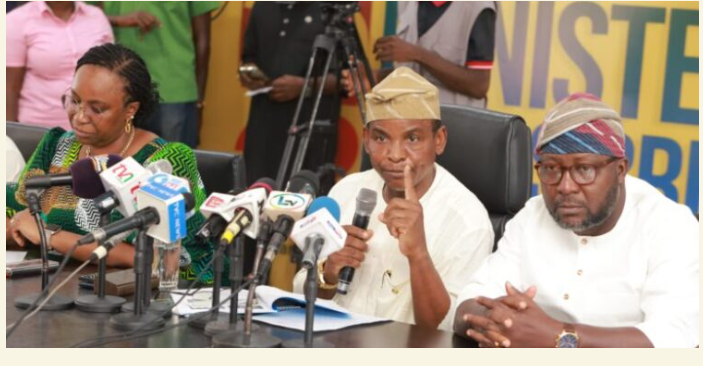Lagos, Nigeria – April 25, 2025
The Lagos State Government has fully sponsored the 2025 West African Senior School Certificate Examination (WASSCE) for 56,134 final-year secondary school students, investing a total of N1.5 billion to ease the financial burden on families and promote access to quality education.
The announcement was made by the Commissioner for Basic and Secondary Education, Mr. Jamiu Alli-Balogun, during the 2025 Lagos State Ministerial Press Briefing held on Thursday in Ikeja.
According to Alli-Balogun, the initiative reflects the state’s unwavering commitment to educational development and social equity.
“This sponsorship not only alleviates financial pressure on parents but also ensures no child is left behind in the pursuit of academic excellence,” he said.
Expansion of Access and Model School Admissions
As part of the government’s efforts to expand access to education, the Commissioner revealed that 17,575 students were successfully transferred from various public and private schools into Junior Secondary School II and Senior Secondary School I across Lagos.
He also noted that 5,815 candidates applied for admission into Lagos State’s model colleges and upgraded secondary schools. Of these, 4,763 met the admission criteria and were granted provisional admission, marking an 81.9% success rate. Plans are underway to increase the number of model schools to accommodate more qualified students.
Technical and Vocational Training
Alli-Balogun praised the Lagos State Technical and Vocational Education Board (LASTVEB) for its strides in bridging the gap between education and employment. The board has established over 600 partnerships with industry players, resulting in 75% of graduates securing jobs and 25% continuing with further education.
Project Zero: Reintegration of Out-of-School Children
Another major highlight was the success of “Project Zero,” an initiative of the Lagos State Universal Basic Education Board (LSUBEB), which has re-engaged over 300,000 out-of-school children and enrolled them into public schools across the state.
Infrastructure and Inclusive Learning
Addressing infrastructural development, the Commissioner announced ongoing construction of 13 new classroom blocks and rehabilitation of 24 others. The comprehensive project includes the provision of security features, recreational facilities, and a central science and ICT hub designed to serve multiple schools.
The Tolu Schools Complex in Ajegunle is also undergoing a significant transformation, which includes the construction of a vocational school and an inclusive centre for students with disabilities. The upgraded facility is expected to become a “tourist attraction” and a model for effective school management.
Emphasis on Creativity, Monitoring, and Digital Learning
The government is promoting co-curricular engagement through art, music, sports, and student-led clubs to foster holistic learning. The “Eko Learners’ Support” program, aired on Lagos Television and social media, continues to offer digital learning resources to students across the state.
Alli-Balogun also stressed the importance of accountability in education. He disclosed that the Office of Education Quality Assurance (OEQA) has been tasked with stricter monitoring and will provide transparent reports on truancy, misconduct, and teacher performance.
“Any teacher found guilty of immoral conduct, examination malpractice, or negligence will face disciplinary measures in line with existing laws,” he stated.
A Shift to STEAM Education
Under the T.H.E.M.E.S Plus Agenda, Lagos is transitioning from the traditional STEM (Science, Technology, Engineering, and Mathematics) model to the more inclusive STEAM framework, which incorporates Arts into the curriculum to encourage creativity and innovation among students.
The Commissioner concluded by expressing pride in the achievements of Lagos students, who continue to excel in both national and international academic competitions.
With these sweeping reforms and investments, the Lagos State Government continues to set the pace in education, prioritizing equity, innovation, and sustainable development for the benefit of future generations.

